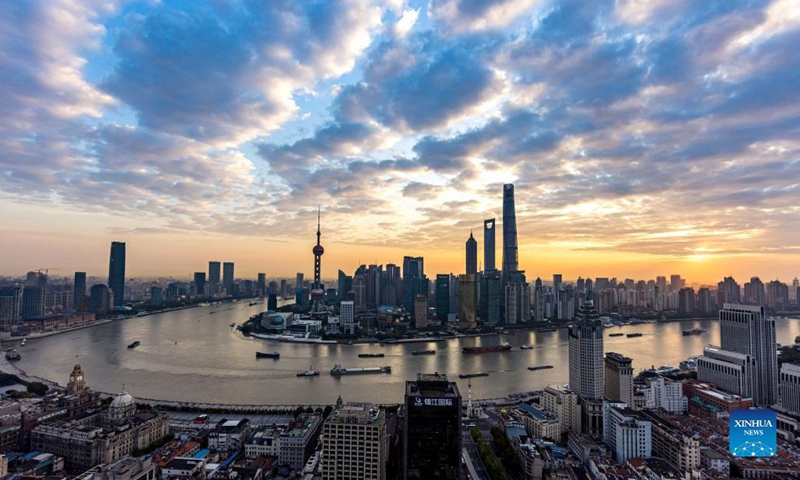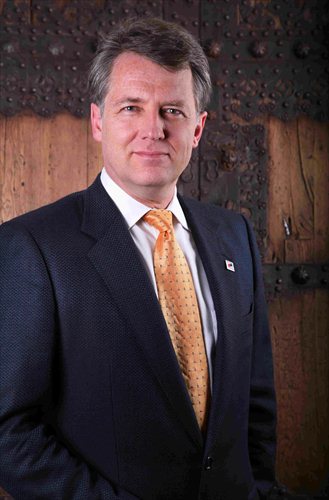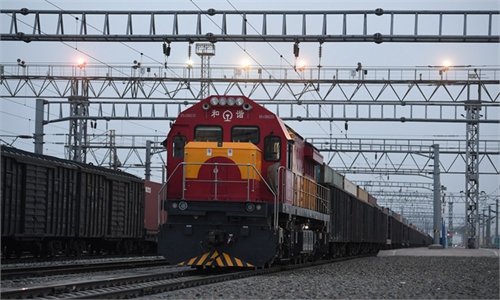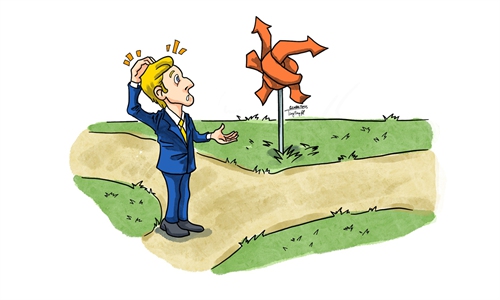GT Exclusive: EU firms stick to one-China principle on Taiwan question: business leader

Photo taken on Nov. 3, 2021 shows the morning scenery in east China's Shanghai. The 4th China International Import Expo (CIIE) is scheduled for Shanghai from Nov. 5 to 10.(Photo: Xinhua)
"The European Union has made it very clear that it sticks to the one-China policy," Jörg Wuttke, president of the European Union Chamber of Commerce in China, said in an exclusive interview, adding that while there are business interests between the EU and the island of Taiwan, it has no political bearing. "It is not that we would compromise our relation with the People's Republic [of China]. This is simply not going to happen."
The remarks come as Lithuania is on thin ice on the Taiwan question after its reckless move. China's Foreign Ministry vowed on Wednesday to make the Baltic country "pay a price for its mistakes."
During the wide-ranging interview, Wuttke also stressed that economic ties between China and Europe are set to be "very strong" regardless of how China-US relations develop, but the European business community hopes that the bloc's political relations with China will never sink to a point that's similar to the downward spiraling relations between Beijing and Washington.
"The economic ties between China and Europe are very strong, and for us, we do business not on the basis of one call or one meeting. The underlying strength of the Chinese economy and the kind of potential the Chinese economy has is important, and we're [in China] for the long haul," Wuttke said.
Last week, the EU postponed a confidential plan to upgrade its trade ties with the island of Taiwan, one day after the China-US virtual summit, the South China Morning Post reported.
But on Wednesday, Reuters reported that the EU is set to renew sanctions on Chinese officials for claims regarding Northwest China's Xinjiang Uygur Autonomous Region, risking to further strain bilateral relations.
"The relationship between China and the US was really poor, and we hope that China-Europe relations will never be that poor politically," Wuttke noted.
But the complex relationship between Beijing and Brussels would make it very hard to restart work on the Comprehensive Agreement on Investments (CAI) in the short term.
Wuttke said he has "no hope" for the agreement to go anywhere in the short term. "Our business is being politicized… and we're the victims of the sanction forces."

Joerg Wuttke, president of the European Union Chamber of Commerce in China Photo: Courtesy of the European Union Chamber of Commerce in China
In May, the European Parliament passed a motion, freezing debate on the deal in response to Chinese sanctions, which were countermeasures to European sanctions on China over Xinjiang-related claims.
Business insiders said that the stalled CAI won't weigh on the vigorous bilateral economic ties. Wuttke pointed to two examples of rising European investment in China to date this year and the gradual opening of Chinese ports for foreign vessels, including from Europe, as international transshipment ports.
"The [economic] direction is moving more toward intensity. Europe has a lot to offer toward China's carbon peak goals, and we have a lot of technologies and experience that China can cooperate" on, Wuttke said.
Wuttke also called for the opening of more "travel fast lanes" during the interview, as the European business community categorizes difficulty in travel as one of the "biggest" challenges for operations in China.
"It reduces engagement and erodes our business participation. We welcome any opening-up and any [upgrading of] fast track arrangements. We need people-to-people exchanges," Wuttke said.
He said the chamber has arranged 11 confirmed chartered flights between China and Germany for the upcoming Christmas holiday season, carried by a Boeing 747 jet.
In the first ten months, bilateral trade between China and Europe soared 20.4 percent year-on-year to 4.34 trillion yuan ($679.6 billion), customs data showed.



